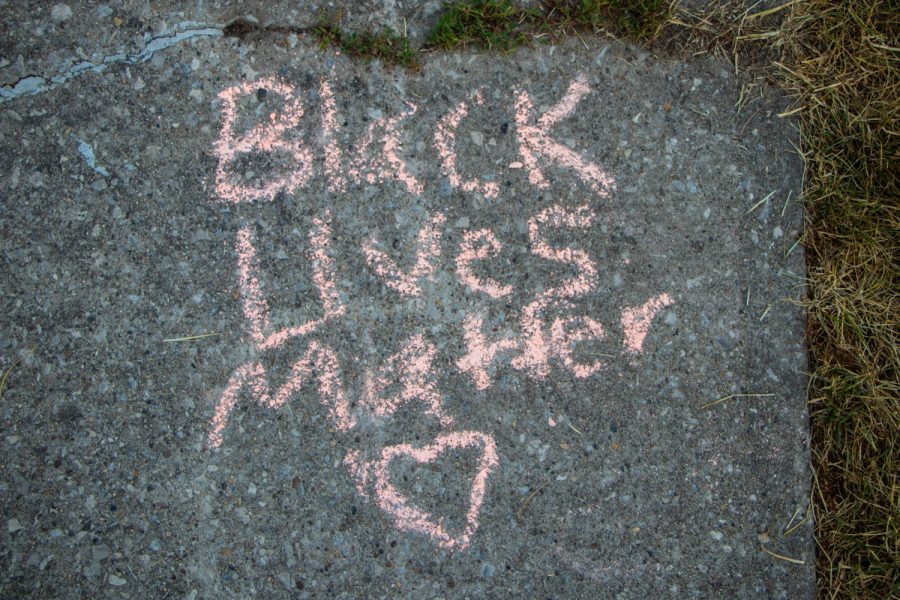Opinion | A nuanced exploration of Critical Race Theory
Critical Race Theory, albeit flawed, reveals a basic truth about American Society
The words “Black Lives Matter” is seen written in chalk at a Juneteenth celebration hosted by Iowa Freedom Riders on June 19, 2021.
June 20, 2021
Critical race theory is the new existential threat that must be purged from our great nation, according to Iowa Republicans.
Like the previous threat —Sharia Law— Republicans seemingly have little to no understanding about critical race theory, or its critique of American society: legal structures within the U.S marginalize Black Americans and other historically oppressed groups.
To operationalize critical race theory, it is imperative to trace its intellectual roots and be cognizant of what critical theories in general try to reveal.
Max Horkheimer, one of the first critical theorists, contended that critical theories have to accomplish three things: identify an existing social problem, establish how society perpetuates that problem, and determine a set of pragmatic goals that society can attain in minimizing the problem.
In addition, French philosopher Michel Foucault’s idea of the genealogical method is also important to understanding what critical race theory attempts to reveal. Through this method, he aimed to explore how those in power use knowledge to further expand and maintain their power
Third, the most important influence on critical race theory is the work of the American sociologist W.E.B du Bois. He argued that Black Americans ought to not assimilate into and submit to white society, but rather work to make the institutions of American society work for all people.
Critical race theory is a theory of jurisprudence that was developed in the 1970s by Black lawyers and law school students. It synthesizes the ideas of Horkheimer, Foucault, and du Bois.
These Black legal scholars argued that the civil rights legislation of the 1960s failed to bring true reform to American institutions rather than create racial equality.
This is still apparent today, as Black Americans are incarcerated at rates five times higher than white Americans and are substantially less wealthy than their white counterparts. This underscores the racial wealth gap between white and Black families.
Compared to their white counterparts, Black Americans have significantly lower rates of life expectancy and household wealth, and they are more likely to be killed out of cold blood by a legal system supposed to protect them.
These structural inequalities would be defined as systemic racism that perpetuates white supremacy in the United States.
Finally, the most integral piece of critical race theory is the emphasis on sharing the experiences of minorities oppressed by U.S. institutions. This storytelling is meant to highlight experiences that contradict or disprove official stories that institutions dispel to the general public.
While the theory has gained traction and popularity among mainstream academics and policymakers, critical race theory does have serious flaws because of its narrow framework and reliance on storytelling.
In many policy debates today, those who have attempted to incorporate critical race theory ideals within their plans have oversimplified socio-economic problems facing the country today.
In debates surrounding inequality, many influenced by critical race theory have begun to frame welfare policy in terms of racial equity because Black poverty is facilitated by white supremacy. Yet, this view that poverty is a symptom of white supremacy obscures the fact that many white people in America are facing poverty, as well.
When focusing on stories and race rather than socio-economic status and empirical evidence, those influenced by critical race theory are actually ill-equipped to deal with disparities within American societies.
Critical race theory, like many ideas that the right opposes, has been twisted by Republicans to the point where they have begun to argue that it is a threat to American democracy. Despite some of the glaring flaws within critical race theory scholarship, the basic premise of the theory – that the U.S continuously fails and harms Black people – is self-evidently true.
Columns reflect the opinions of the authors and are not necessarily those of the Editorial Board, The Daily Iowan, or other organizations in which the author may be involved.














